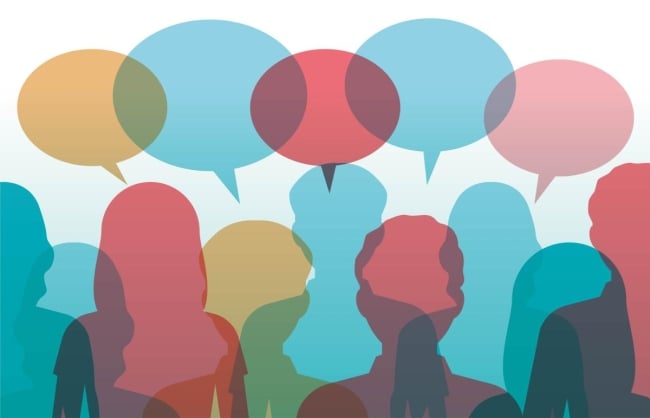You have /5 articles left.
Sign up for a free account or log in.

wenmei Zhou/DigitalVision Vectors/Getty Images
A couple of years ago, I attended a departmental chairs’ discussion about the inhibition of many students to express their thoughts in class for fear that they will be branded as unredeemable—a racist, a transphobe, classist, ableist, etc. While pleased this topic was discussed, as a veteran professor of religious studies I winced when hearing a refrain that went something like “We need to create space for students to make mistakes and to learn in a gentler fashion why their ideas are mistaken and hurtful to others.”
Yes, many ideas are mistaken, and some opinions may be hurtful to others. But I was, and remain, skeptical that every idea that makes others uncomfortable is mistaken or should not be expressed, even if it leaves some in the classroom—possibly even the professor—upset.
My own college, like many institutions, is laser-focused on diversity, equity and inclusion (DEI). But it is also wrestling with how to protect academic freedom and bolster freedom of expression to allow the airing of a wider set of ideas. Many colleagues and administrators see these as two goals that can both be achieved by some delicate balancing act. I have my doubts. I think the two aims may be rooted in distinct and somewhat incompatible intellectual frameworks.
The goal among many in higher education advocating for DEI is to foster not only the understanding of but also the granting of respect to each viewpoint and those who hold it. On the other hand, academic freedom and freedom of expression writ large grew out of ideas of toleration. When John Stuart Mill writes that the “prevailing opinion on any subject is rarely or never the whole truth” and that “he who knows only his own side of the case, knows little of that,” he is precisely right. Put simply, the toleration of diverse viewpoints assumes that you might detest the views others hold and might even detest those holding these views. Yet toleration allows such views to be expressed. Those advocating for DEI, in contrast, frequently want to shut out an ever-widening set of ideas, including some that are held by many.
Toleration is closer to establishing a “cold peace” between many often-competing ideas or worldviews, because it recognizes that reaching a clearer understanding of someone else’s views may not lead to greater respect for those espousing such thoughts. It is not always the case that by talking long enough we will understand and come to respect someone else’s ideas. Of course, there are opinions that deny basic facts that deserve little to no air time, like debates about whether the earth is flat. But on serious topics we should be striving to have the widest possible range of discourse rather than generating a growing list of taboo topics, or subjects on which only those claiming certain identities can speak.
This is a particularly pressing problem in the area of religion, as not infrequently religious ideas held by differing groups are incompatible. In fact, the views held by one religion or sect often entail viewing another as grossly in error. Thus, beginning in the New Testament itself, many Christians have thought that Jews do not know how to read their own Bible, because if they did, they would acknowledge that Jesus was the promised messiah to whom the Jewish Scriptures pointed. Concurrently, many Jews over the past two millennia have thought that Christians engage in something like idolatry by worshipping a human being.
I mention these religious examples, which could easily be multiplied, for two reasons: first, political tolerance in the Western world developed in reaction to conflicts between various Christian sects. Second, many in academia fail to acknowledge that different people can hold distinct moral ideas, some of which will be offensive to others. Thus, many devout Jews, Christians and Muslims think certain sexual acts, perhaps between unmarried couples or those of the same sex, are sinful. I am fairly sure some of my students hold such beliefs, but I am certain they would not feel comfortable voicing them in the classroom.
Faculty, staff and students in liberal arts colleges, particularly elite ones, rarely think of religion when they invoke DEI. I have rarely if ever heard anyone speaking about DEI concerns say that we need to foster a more inclusive environment in which students from devout religious or conservative political backgrounds can voice their views on controversial issues like abortion or affirmative action. My sense is that proponents of DEI would counter that such views are disrespectful and hurtful, thus making clear that, whatever diversity means, it does not include a diversity of ideas from across the religious and political spectrum.
In college classrooms, discourse is frequently stifled in the service of inclusion, making it difficult to engage in open inquiry. While it might not occur anytime soon, a return to the icy peace of toleration over the warm embrace of forced mutual respect for each other’s ideas would help restore a more vibrant and open academic culture. It might even bring down the temperature in our current political culture. A warm peace might be possible in some situations, but tolerance seems better suited than inclusion in the classroom and likely also in our multicultural society. It allows those holding different cultural assumptions to think and live in accord with their deepest beliefs and commitments, even when doing so leaves others uncomfortable or offended.








